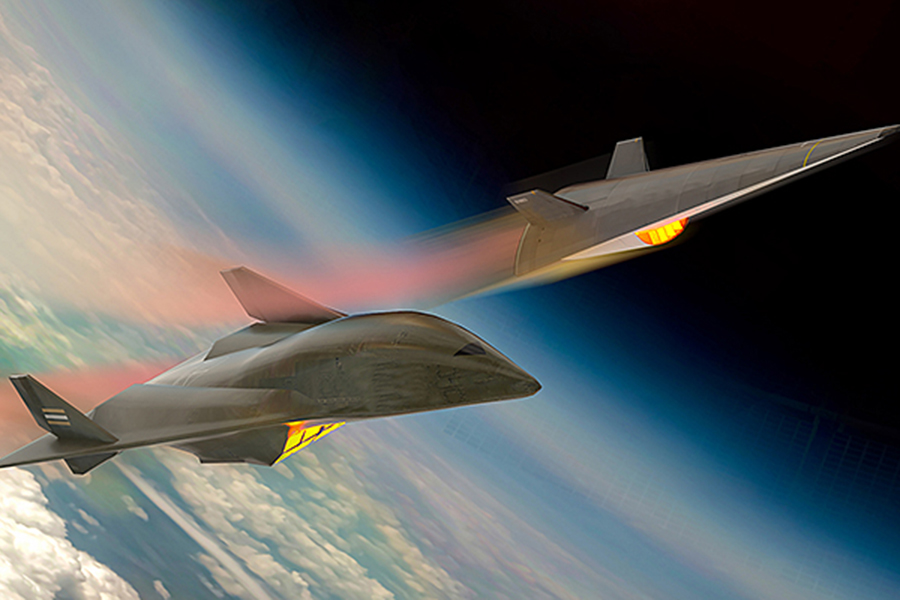Purdue receives its largest industry research-testing funding

Over the last 12 months and through significant investment, Purdue has built up its aerospace and hypersonics campus in its Discovery Park District with both university-owned and industry-owned research facilities, and a growing range of federally- and industry-funded research projects.
Purdue has nearly 40 world-renowned researchers in hypersonics and boasts some of the country’s most comprehensive hypersonics research capabilities, including navigation, aerodynamics, aerothermal effects propulsion, autonomy, system engineering, high-temperature materials and manufacturing.
“Across three tracks — university research, industry growth and consortium potential — Purdue has become the national epicenter of hypersonic research and testing," said Mung Chiang, executive vice president of Purdue University for strategic initiatives and the John A. Edwardson Dean of the College of Engineering.
Purdue University’s investment and research projects
In April 2022, the College of Engineering received the largest single industry research-testing funding on record — $75 million over 10 years from Rolls-Royce. Some of the work will be carried out in the new facility of ZL9 for high-speed propulsion at Maurice J. Zucrow Laboratories. The state-of-the-art $73 million lab will provide testing capabilities at the extreme pressure and temperature conditions experienced in actual hypersonic flight. In addition, the lab will feature new testing capabilities for innovative research in rocket combustion and gas turbine engines.
The $43 million Hypersonics and Applied Research Facility (HARF), which broke ground in late 2021, will house the only Mach 8 quiet wind tunnel in the world and the Northrup-Grumman-donated HYPULSE, a reflected shock/expansion tunnel. The Air Force Research Laboratory awarded a contract for the development of the Mach 8, further solidifying the State of Indiana’s major role in one of the U.S. Department of Defense’s top technological priorities — the development of hypersonics systems. These tunnels allow the re-creation of different real-world scenarios, from a spacecraft’s atmosphere reentry to Mach 5+ missile flight.
Another federally funded project in HARF is advanced manufacturing. In February 2022, Purdue was funded for the $18.6 million Hypersonics Advanced Manufacturing Technology Center (HAMTC), which will focus on developing high-temperature materials and creating new manufacturing processes to build and join these materials, which will extend hypersonic vehicles’ capabilities and apply to other industries. The facility offers a single location for industry partners — including GE Additive, Dynetics, Lockheed Martin, Aerojet Rocketdyne, GE Edison Works, and Boeing — to work on materials and manufacturing innovations and provide access to testing capabilities at Purdue. GE Additive will be the primary partner for additive manufacturing, providing additive manufacturing machines that are customized to processes developed in HAMTC.
Rolls-Royce’s growth at Purdue
Purdue and Rolls-Royce have a decades-long partnership that continues to grow. In April, the company announced the detail of a $204 million investment that will include three new state-of-the art facilities with the addition of high-altitude, hybrid electrical and hypersonic testing. The move will form a significant large-scale testing campus at Discovery Park District with at least 30 new full-time jobs added.
In August 2021, the manufacturing giant publicized its plan to grow its already-extensive footprint at Purdue by upgrading the company’s electronic engine controls facility. This commitment marked the greatest single economic development success to the university ecosystem and the largest research collaboration with a private sector partner in Purdue’s history.
Nonprofit consortium for ground testing
A third track in Purdue’s leadership of hypersonic research and testing is physically hosting an independent, nonprofit consortium defined by industry memberships. In August 2021, during the two-day, in-person Hypersonics Summit hosted by Purdue and the National Defense Industrial Association, the University and Purdue Research Foundation announced the intent to host the Hypersonic Ground Test Center (HGTC), a central shared utility to support multiple test cells and laboratories.
The first-in-the-nation HGTC will be administered by a new nonprofit consortium of national defense industry partners that will manage capital and operational costs. Rolls-Royce is the first aerospace industry member of the consortium.
Multiple companies can undertake work simultaneously on site while being ensured full protection of intellectual property and sensitive work. The HGTC can provide hypersonic testing streams reaching speeds up to Mach 7.5 — more than 5,000 mph.
